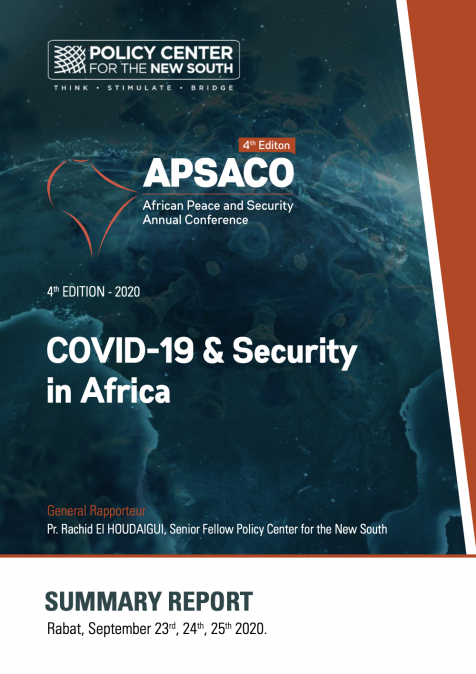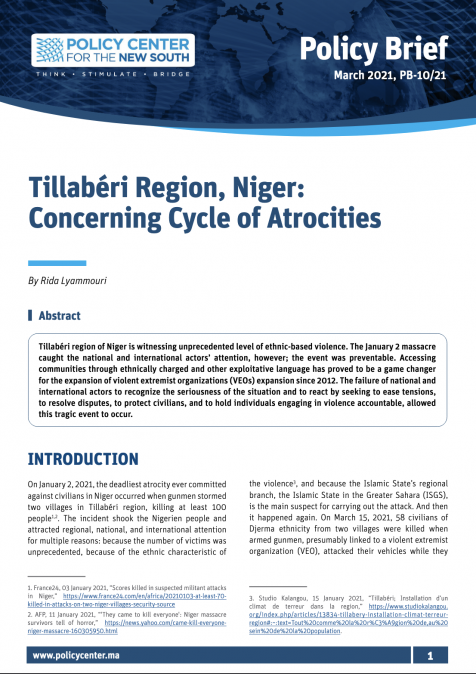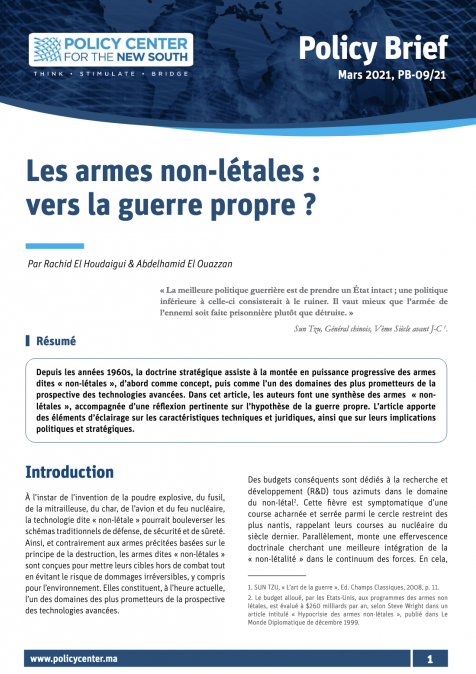John Sawers, former Chief of the Secret Intelligence Service (MI6), shares his insights on how security threats have evolved with the rise of digital technologies and social media. In this interview, he offers a compelling exploration of the shift from traditional methods to contemporary security challenges. Sawers examines how intelligence approaches have adapted to address new threats, including the influence of social media on democratic processes and the evolving global geopolitical landscape. The discussion provides An insightful analysis of the current dynamics in intelligence work and highlights the critical issues facing intelligence services in an increasingly interconnected and digital world.
RELATED CONTENT
-
AuthorsMay 20, 2021The fourth edition of the African Peace & Security Annual Conference (APSACO) was held on September 23-25, 2020 under the theme ‘COVID-19 & Security in Africa.’ The three-day event, organized by the Policy Center for the New South (PCNS), was composed of two panels and two workshops: - Panel 1: The Security Sector in Africa During and After the COVID-19 Health Crisis - Panel 2: The Privatization of Violence in Africa: Non-State Armed Groups and Private Security - Workshop ...
-
 AuthorsHéni NsaibiaMay 20, 2021In the face of repeated Europol-led crackdowns, and frequent flagging of content by the EU Internet Referral Unit (EU IRU), government agencies, anonymous users, and outfits specialising in countering terrorist propaganda—on the Telegram messaging application, as well as the frequent use of artificial intelligence to detect and remove terrorist propaganda on mainstream social media sites—terrorist organisations have adapted their propaganda output. Crackdowns and susp ...
AuthorsHéni NsaibiaMay 20, 2021In the face of repeated Europol-led crackdowns, and frequent flagging of content by the EU Internet Referral Unit (EU IRU), government agencies, anonymous users, and outfits specialising in countering terrorist propaganda—on the Telegram messaging application, as well as the frequent use of artificial intelligence to detect and remove terrorist propaganda on mainstream social media sites—terrorist organisations have adapted their propaganda output. Crackdowns and susp ... -
May 4, 2021-Depuis 2016, le Policy Center for the New South et le Centre HEC de Géopolitique organisent chaque année deux éditions des « Dialogues Stratégiques ». Cette plateforme d’analyse et d’échange réunit des experts, des chercheurs provenant de différents think-tanks et du monde académique, ...
-
 AuthorsMay 4, 2021The Sahelian states of Niger, Mali, and Burkina Faso continue to face unprecedented violence arising from multidimensional conflicts. According to the Africa Center for Strategic Studies (2019), “the Sahel has experienced the most rapid increase in activity by militant groups of any region in Africa in recent years. Violent events involving extremist groups in the region have doubled every year since 2015”. In addition to the presence of multiple violent extremist organizations (VEO ...
AuthorsMay 4, 2021The Sahelian states of Niger, Mali, and Burkina Faso continue to face unprecedented violence arising from multidimensional conflicts. According to the Africa Center for Strategic Studies (2019), “the Sahel has experienced the most rapid increase in activity by militant groups of any region in Africa in recent years. Violent events involving extremist groups in the region have doubled every year since 2015”. In addition to the presence of multiple violent extremist organizations (VEO ... -
 AuthorsApril 29, 2021Le Général Azem Bermandoa, porte-parole de l’armée tchadienne, a annoncé, le 20 avril 2021, à 11h00, sur les ondes de la télévision, le décès du président Idriss Déby. Le défunt, touché lors de combats dans le nord du pays, entre l’armée tchadienne et la rébellion du Front pour l’alternance et la concorde au Tchad (FACT), est décédé des suites de ses blessures. Selon certains observateurs, une réunion de négociations avec des membres du FACT se serait terminée par une fusillade qui ...
AuthorsApril 29, 2021Le Général Azem Bermandoa, porte-parole de l’armée tchadienne, a annoncé, le 20 avril 2021, à 11h00, sur les ondes de la télévision, le décès du président Idriss Déby. Le défunt, touché lors de combats dans le nord du pays, entre l’armée tchadienne et la rébellion du Front pour l’alternance et la concorde au Tchad (FACT), est décédé des suites de ses blessures. Selon certains observateurs, une réunion de négociations avec des membres du FACT se serait terminée par une fusillade qui ... -
April 20, 2021سيخصص برنامج حديث الثلاثاء حلقته لهذا الأسبوع إلى تحليل ومناقشة تمدد التنظيمات الإرهابية بإفريقيا وتداعياتها على الأمن القاري باستضافة عبد الحق باسو، باحث بارز بمركز السياسات من أجل الجنوب الجديد. إن توالي الأزمات تؤثر على الأمن بالقارة الإفريقية بالإضافة إلى تنامي نشاط الجماعات الإرهاب...
-
Len Ishmael & Abdessalam JaldiApril 02, 2021In a world where conventional threats to public safety and international security are increasingly a back seat, the Covid-19 pandemic has opened a new chapter in the discussion on how to ...
-
AuthorsMarch 24, 2021Tillabéri region of Niger is witnessing unprecedented level of ethnic-based violence. The January 2 massacre caught the national and international actors’ attention, however; the event was preventable. Accessing communities through ethnically charged and other exploitative language has proved to be a game changer for the expansion of violent extremist organizations (VEOs) expansion since 2012. The failure of national and international actors to recognize the seriousness of the situa ...
-
March 23, 2021Discussions around the special Issue of International Development Policy Panel 1 : Drug policies, Security & Peacebuilding The 12th volume of International Development Policy explores the relationship between international drug policy and development goals, both current and within a...
-
AuthorsAbdelhamid El OuazzanMarch 18, 2021Depuis les années 1960s, la doctrine stratégique assiste à la montée en puissance progressive des armes dites « non-létales », d’abord comme concept, puis comme l’un des domaines des plus prometteurs de la prospective des technologies avancées. Dans cet article, les auteurs font une synthèse des armes « non- létales », accompagnée d’une réflexion pertinente sur l’hypothèse de la guerre propre. L’article apporte des éléments d’éclairage sur les caractéristiques techniques et juridiqu ...






